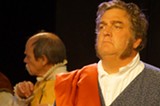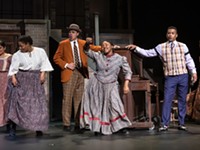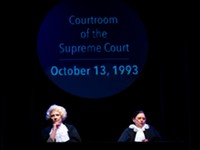[
{
"name": "500x250 Ad",
"insertPoint": "5",
"component": "15667920",
"parentWrapperClass": "",
"requiredCountToDisplay": "1"
}
]
The current production of "Julius Caesar" at MuCCC marks two milestones for Rochester Community Players and its Shakespeare Players shingle. It is the start of the 20th season for the Shakespeare Players. (It's worth noting that the company's Shakespeare offerings have only increased in recent years, including the return of its Shakespeare for Young Audiences program later this season.) And it kicks off the 90th season for RCP itself, which is no small feat.
Chances are just about everybody knows the basic gist of "Julius Caesar." You likely read the Shakespeare play in high school or college, or you got the broad strokes somewhere along the line in life. Beloved Roman war hero and statesman Caesar maybe started to believe his own press a little too much. His ambition perhaps got the best of him. A cabal of fellow senators conspired to take him out before he ascended to what they feared would be an unassailable position of power (and, coincidentally, diminish their own influence). Halfway through March in 44 B.C. Caesar was assassinated, ending his reign and sparking bitter civil wars in Rome.
The story is nothing new, but the Shakespeare Players' staging of it offers something different than what viewers may be accustomed to. Director Peter Scribner has incorporated a number of what are termed "original practices" by Shakespeare scholars in order to recreate as closely as possible the initial 16th century productions of the play. When you think "Julius Caesar" you likely think togas and Doric columns. In this play, the actors are largely in Elizabethan garb, with Roman flourishes. There are no scene changes, the action never stops, and all of the sound effects are produced acoustically by the cast and crew.
The audience is seated in a 3/4 round, so that its members can watch one another as they watch the play. (This led to one hilarious moment where an actor referred dismissively to a group of "wenches" while gesturing to three women in a MuCCC pew; the looks on their faces were priceless.) The house lights remain up for the entirety of the show, so that the actors can see the audience — as they would have via candlelight in Elizabethan parlors and salons. Most important, the actors are encouraged to interact with the audience. The leads in particular make actual eye contact with members of the audience while delivering impassioned speeches. That last element helps to transform a historical play into something that feels fresh and relevant to today's political situation.
Perhaps it was the "original practices," or perhaps it's because I haven't read the play in more than a decade. Regardless, I came away from this production with a very different take on "Julius Caesar." Specifically I came away with different opinions of Cassius and Brutus, the two lead conspirators in the plot to murder Caesar. Whereas the obvious interpretation of Cassius would be that he is conniving and self-serving — and that's definitely there — there is also a nobility to the character, especially in his final moments. Brutus is regarded as one of history's great patsies, but this production hammered home the tragic elements of his character. He was a true believer who sincerely thought he was doing what was best for his people.
Rochester Community Players and its Shakespeare Players are community-theater troupes. As such, there is a wide range of acting ability in their productions. While several of the minor cast members in the show struggled — including Caesar himself, Ed Scutt, who wrestled mightily with his lines especially in the beginning of the show I attended — there is some absolutely wonderful work being produced by several of the lead actors.
Bill Alden is the center of the show as Brutus, and he brings gravity and heart to a deeply conflicted man. Alden turns in an assured performance, and one that is buoyed by the direction to speak directly the audience. His soliloquy in the orchard is genuinely inspiring, and his reactions to the quickly deteriorating situation later in the play feel natural and oddly logical. This is a case of perfect casting: an actor fitting just right into a complicated role.
Alden plays many of his scenes off of Roger Gans as Cassius, who similarly does an excellent job justifying the unjustifiable. It's impossible to make Cassius someone to actually root for — he's a schemer and blatantly corrupt — but Gans at least makes him three dimenstional. His argumentative scene with Alden in Act II features terrific acting from both men.
Zak West has a fascinating arc as Mark Antony. For the majority of Act I he just kind of floats around the stage hugging people with a blissed-out look on his face. I assumed the take was something akin to Antony permanently tripping on Ecstasy. But after Caesar's death, West's Antony comes to life and delivers some electrifying speeches as well as a few sharply barbed zingers. Strong work from this young actor.
The sparse but effective set, eye-catching costumes, and general theatrical efficiency throughout the production are in line with the original Shakespearean practices. But that doesn't make Scribner's directorial restraint any less laudable. The current production of "Julius Caesar" is interesting and evocative, and shows that there is a lot of vitality left in a 2000-year-old story, a 400-year-old play, and a 90-year-old community-theater company.
Speaking of...
Latest in Theater
More by Eric Rezsnyak
-
“Doctor Who” Series 8: “Into the Dalek”/“Robot of Sherwood”
Sep 7, 2014 -

“True Blood” Series Finale: “Thank You”
Aug 24, 2014 -
“Doctor Who” Series 8, Episode 1: “Deep Breath”
Aug 24, 2014 - More »









